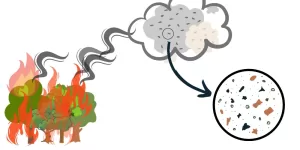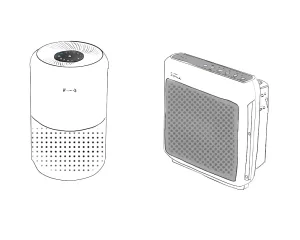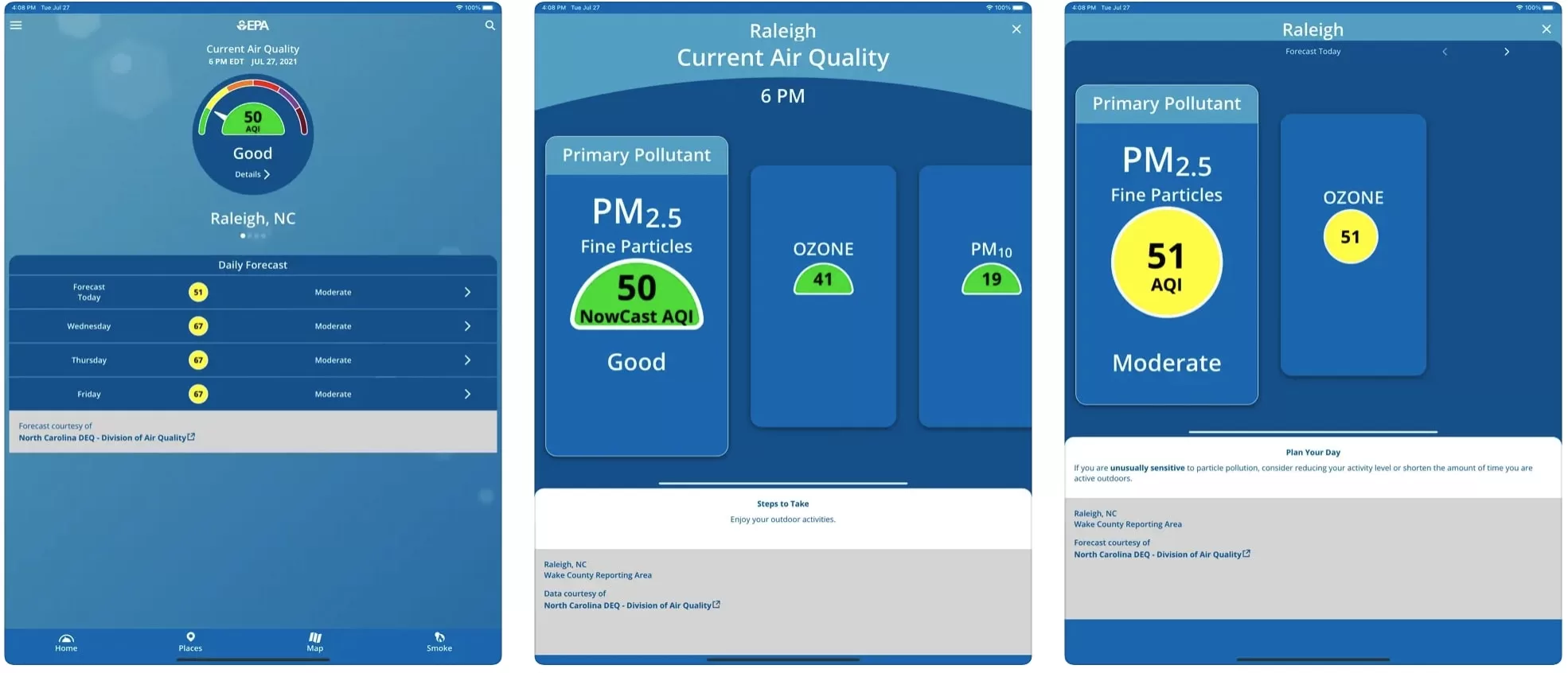Unfortunately, large wildfires are becoming more frequent every year because of climate change and global heating. We’ve recently seen huge wildfires in Australia, Canada and the Amazon rainforest. The smoke from these wildfires is a threat to our health, so we need to learn how to protect ourselves. In this post, we’ll see how smoke can affect your health and some tips to avoid it.
Table of Content
I. Why is wildfire smoke bad for you?
Why are wildfires increasing?
As you know, weather is changing: summers are getting hotter and drier and the snow is melting earlier in the year.
As a consequence, forests are drier. If lighting strikes, or if somebody drops a cigarette, all that vegetation acts as fuel, burning up really quickly.
How bad is it? Well, each year, 500,000 square kilometers of land get burned by wildfires.
When wildfires occur, they release large amounts of smoke with fine particles and gases. This smoke can travel over long distances, affecting both nearby areas and regions far away.
If you get in contact with the smoke it can harm your heart, lungs, brain and skin.
Why is wildfire smoke so dangerous?
Wildfire smoke consists of a mix of fine particles and toxic gases.
The smallest particles, known as particulate matter (PM), are tiny solids or liquids that are less than 2.5 micrometers in diameter. We call them PM2.5 (1).

These particles (PM2.5) are the most dangerous because they can penetrate the deepest into your lungs. They can even enter your blood, traveling anywhere in your body.
They can make it hard to breathe and make you cough.
Apart from PM2.5, wildfire smoke also contains gases such as carbon monoxide.
When we inhale all these gases and particles, they cause inflammation in any organ they get to. This causes different health issues, including respiratory and cardiovascular problems.
Even a few minutes of exposure can trigger inflammation. However, the longer it persists, the higher the risk.
Which are the people most at risk?
People with lung or heart conditions, like asthma, emphysema, heart failure.
People with asthma and chronic obstructive pulmonary disease. Smoke can worsen their symptoms.
Babies, children, old people. It can put them at risk because their health is the weakest. The risk is higher in people over 65 with preexisting conditions.
I. Why is wildfire smoke bad for you?
1. Respiratory issues:
Fine particles can get deep into your lungs and irritate your lungs.
This can result in symptoms such as:
- coughing
- wheezing
- shortness of breath
- chest discomfort
During active wildfires there’s an 8% increase in asthma hospitalizations (4).
2. Cardiovascular Health:
When you inhale the smoke, all the gases and PM2.5 enter our lungs. Then, they get into your blood, reaching organs like your heart and blood vessels.
This causes irritation, which makes your arteries narrower–which means they become smaller and it’s harder for blood to flow through them.
When your arteries become narrower, it puts extra stress on your heart. It has to work harder to pump blood through narrower blood vessels.
This can make your heart beat faster, and it may also increase your blood pressure.
These effects are especially risky for people with heart problems. It even increases the chances of having a heart attack, which is a very serious health problem.
You want some evidence? There is spike in ambulance calls for heart attacks and strokes within an hour after PM2.5 increased (5).
3. Eye and Skin Irritation:
When the smoke touches your eyes, it can make them red, itchy, and watery.
It feels like there’s something irritating your eyes, like sand or dust. This is because your eyes are very sensitive and the smoke hurts them.
The smoke also irritates your skin. If you’re outside during a wildfire, your skin might start feeling itchy.
Some people may even develop a rash or redness on their skin.
If your eyes or skin become irritated from the smoke, wash them with clean water– it will provide some relief.
4. Headache
If you breathe too much smoke, it feels like smoking cigarettes too fast.
Some people have headaches and they feel dizzy, because their brain is not getting the usual amount of oxygen.
After a while, you may also get nausea and vomit.
5. Mental Health Effects:
After a wildfire, some people will have to deal with traumatic experiences such as property loss and displacement.
That’s why residents in affected areas are at an increased risk for mental illness, including:
- post-traumatic stress disorder
- depression
- insomnia
These psychological effects can go on for years, and children and adolescents are particularly vulnerable (3).
II. How can you protect yourself from wildfire smoke?
1. Stay indoors. Use a mask to go out
The best thing you can do is stay indoors, with the windows closed. Avoid outdoors activities until the fires are out.
If you really need to go outside, make sure you wear a mask. But don’t use a simple surgical mask. Instead, get yourself a N95 or N99 face mask, covering both your nose and mouth.

2. Keep the air in your house as pure as possible
If you have air conditioning, switch the settings to “recirculate”. If you don’t, I recommend you use some air filtration system.
You can buy a small air purifier with HEPA filters. These devices will clean the air and make sure they trap even the smallest particles.

3. Go to the doctor if you start having symptoms.
If you start having concerning symptoms, go to the doctor.
What are concerning symptoms? Those related to your lungs and heart. If you have difficulty breathing, chest pain or palpitations, something serious could be happening.
4. Monitor the quality of the air.
There are some apps like AirNow Mobile App that will update you on the air quality in your area. That way, you’ll have more objetive information.
This is important when the fires are not close to your house. The smoke can travel thousands of miles, so it may not be so obvious that the air quality is poor.

You can also try the Purple Air website. They sell air quality monitors and also offer a real-time air map.
5. Don’t forget your dog
Remember that smoke will also affect your pets. Don’t make the mistake of forgetting your dog outside.
If you do, they can also have problems with their lungs, heart, eyes…
To sum it up
Wildfire smoke can be dangerous: inhaling it can lead to respiratory and cardiovascular problems. It can cause eye and skin irritation as well.
To protect yourself, you need to stay informed about wildfires in your area and take some measures such as staying indoors, using masks and air filtration systems.
Also, go to the doctor if you start having symptoms.
These simple measures will ensure the well-being of yourself and your family.
Sources
-
- https://www.nationalgeographic.com/science/article/how-breathing-wildfire-smoke-affects-the-body
- https://www.who.int/health-topics/wildfires
- https://www.nejm.org/doi/full/10.1056/NEJMsr2028985
- https://agupubs.onlinelibrary.wiley.com/doi/full/10.1002/2017GH000073
- https://ehp.niehs.nih.gov/doi/10.1289/EHP5792
- https://www.healthline.com/health-news/how-wildfire-smoke-affects-the-body-and-what-you-can-do-to-protect-yourself
Leave a Reply